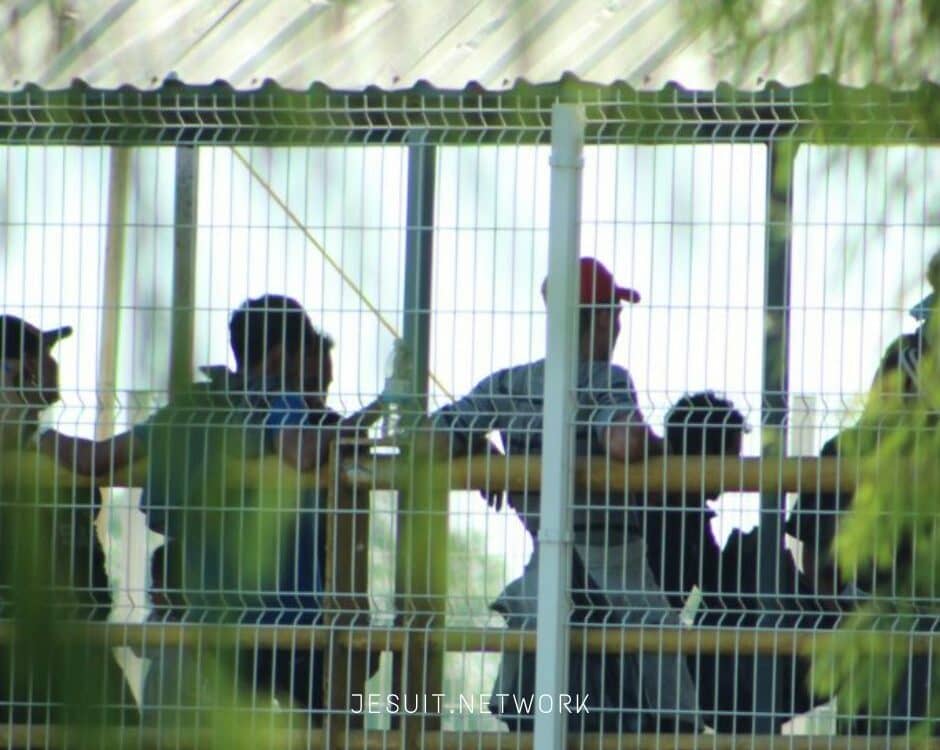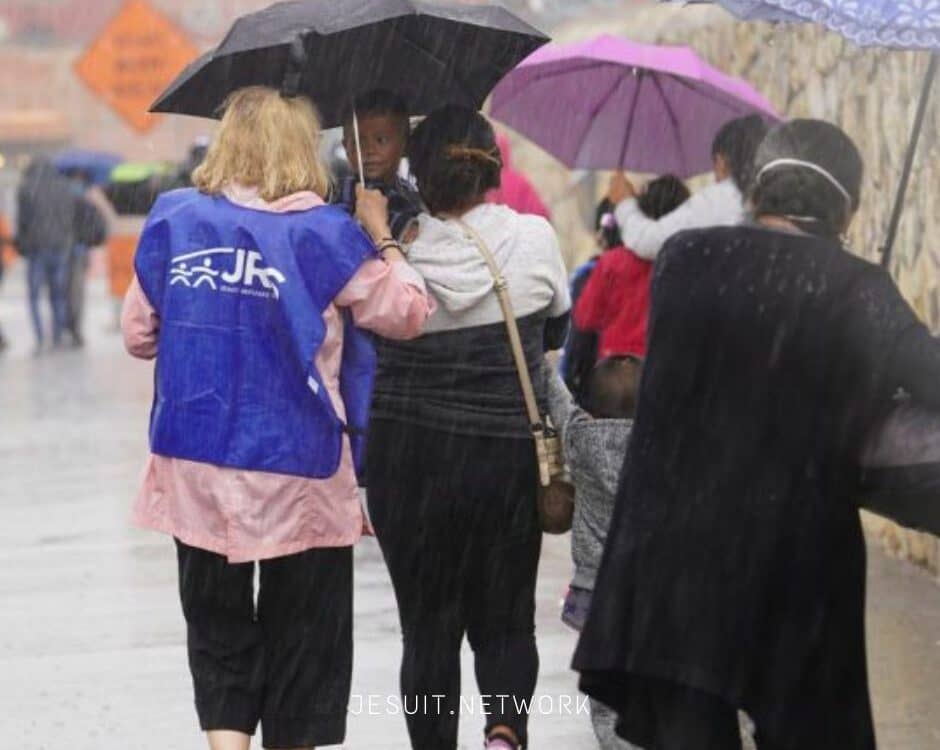[vc_row][vc_column][vc_column_text]
This post was written by Sabina Barone from the Jesuit Network for Migrants in Latin America and the Caribbean as a thoughtful reflection on the successes and insights from an active Networking Campaign- The Campaign for Hospitality.
In January of 2014, the Jesuit Network for Migrants in Latin America and the Caribbean (RJM-LAC) launched the first campaign of its kind under the shared theme,
The Campaign for Hospitality.
[pullquote align=”right”] Working in networks confronts us with our limitations and contradictions.[/pullquote]This campaign brought forth from its inception three main objectives. The first of which is internal; to strengthen the coordination, promote expansion and build internal understanding of the network. The second and third are both external. The second goal is to amplify working as a network through collaboration with other networks and organizations of civil society. Finally, the third is to develop a culture of respect for the human rights of migrants, refugees, and displaced peoples. And in doing so, effectively reverse the negative image of these populations while promoting the value of hospitality.
The campaign aims to raise awareness, understood as
social advocacy, that is to say: to contribute to the promotion of social change by altering social perceptions (public opinion). And with the goal of creating a citizenry open to mobilizing in favor of a cause that is being promoted [by the network].
After two years of work, the campaign has transformed into a
“network for networks”: It consists in the intersections of varying networks of the Society of Jesus in Latin American and the Caribbean with an open disposition for collaboration with external networks and organizations beyond the Society. There are nine networks as co-promoters: RJM-LAC, SJRLAC, FIFyA, FLACSI, CIEs, CVX, Jesuit Parishes, ALyC, CS SJ AL, AUSJAL, ALER
[1] and the Social and Pastoral Program of Caritas Ecuador. From within each of these organizations, incredible work has been carried out with extensive variety at the local and regional level. Recently in October of 2015, the campaign was designated as a “best practice” and adopted by the bishops on the borders of Ecuador and Peru.
The experience of working on this campaign for two years has allowed us to understand a great deal from working in networks. Firstly, one learns the most about networks by working within networks. You cannot hope to have an environment that is 100% favorable or conducive to working in networks, rather networks are built and strengthened when time is dedicated to them, with a continuous self evaluation process. This was one of the great intuitions that motivated RJM-LAC to build the Campaign for Hospitality, and the experience from this campaign has confirmed that as a network, we learn by doing.
In addition, we have identified the following key elements that have been essential to the success of working as a network. Among these are:
Knowing the terrain. This includes both the internal institutional environment and the external social environment. This allows objectives to be clearly defined and to appropriately utilize the resources of all members of the network.
Fostering an active voluntary consultation process, this allows for consensus building throughout the process of design and implementation.
To promote dialogue, compromise, exercise patience and cultivate a vision that is “Glo-cal”- maintaining local roots while appreciating and valuing what happens at the global level, and vice versa.
Working in networks confronts us with our limitations and contradictions. It reveals our attachment and comfort in proceeding with antiquated or ineffective ways that do not address the complexity of current social realities. We cannot forget to note the disproportion between the finitude of what we sow, the limitations of our work, and the great news of the fruits of justice that we hope for. This tension calls us to leave our individuality, our short term plans, and adopt a “
logic of collaboration”. Opening ourselves more and more to collaboration among works of the Society and external organizations. And in doing so, acknowloging the intrinsic
generosity that this work brings about.
[1] Jesuit Refugee Service of Latin America and the Caribbean (SJR-LAC), The International Federation of Fe y Alegría (FIFyA), The Latin American and Caribbean Federation of Jesuit and Ignatian Schools (FLACSI), Ignatian Spirituality Centers (CIEs), Christian Life Communities (CVX-CLC), Jesuit Social Centers (CS SJ), Association of Jesuit Univiersities in Latin America (AUSJAL), Latin American Association for Radio Education (ALER).
[/vc_column_text][vc_raw_html]JTNDc3R5bGUlM0UlMEElMEElMjN0aXRsZSUyQyUyMCUyM2hlYWRlciUyMCUzRSUyMGRpdi5jb250YWluZXIlMjAlN0IlMEFkaXNwbGF5JTNBbm9uZSUzQiUwQSU3RCUwQSUyM25hdmlnYXRpb24lN0IlMEFkaXNwbGF5JTNBbm9uZSUzQiUwQWJvcmRlci1ib3R0b20lM0ElMjAxcHglMjBzb2xpZCUyMCUyM2RkZGRkZCUyMCUyMWltcG9ydGFudCUzQiUwQSU3RCUwQWg0LnRpdHVsZXRlJTIwJTdCJTBBbWFyZ2luLXRvcCUzQTEwcHglMjAlMjFpbXBvcnRhbnQlM0IlMEElN0QlMEFhJTNBaG92ZXIlMjAlN0IlMEFjb2xvciUzQSUyMCUyMzAwODJDOCUyMCUyMWltcG9ydGFudCUzQiUwQSU3RCUwQSUzQSUzQXNlbGVjdGlvbiUyMCU3QiUwQWJhY2tncm91bmQlM0ElMjAlMjMwMDgyQzglMjAlMjFpbXBvcnRhbnQlM0IlMEElN0QlMEFkaXYucG9zdC10aHVtYiUyMCU3QiUwQW1hcmdpbi1ib3R0b20lM0EyMHB4JTNCJTBBJTdEJTBBJTIzdWktaWQtMiUyQyUyMCUyM3VpLWlkLTMlMkMlMjAlMjN1aS1pZC02JTJDJTIwJTIzdWktaWQtOCUyMCU3QiUwQWhlaWdodCUzQWF1dG8lMjAlMjFpbXBvcnRhbnQlM0IlMEElN0QlMEElM0MlMkZzdHlsZSUzRSUwQQ==[/vc_raw_html][/vc_column][/vc_row]





